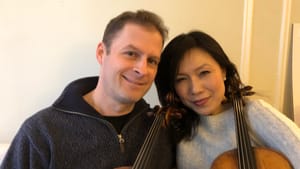Stay in the Loop
BSR publishes on a weekly schedule, with an email newsletter every Wednesday and Thursday morning. There’s no paywall, and subscribing is always free.
Voilà violas
The Philadelphia Chamber Music Society presents a program for violas and piano

A livestreamed January 7 concert from the Philadelphia Chamber Music Society highlighted the unusual combination of the piano and the viola, an instrument that rarely takes center stage. Watching violists Hsin-Yun Huang and Misha Amory play from memory so freely while I sat comfortably watching in my home made me feel as if I were royalty listening to musicians in my court.
Sensitive collaborations
Streamed from the American Philosophical Society, the program began with Huang and Amory playing Jean-Marie LeClair’s (1697-1764) Sonata No. 4 for Two Violins in A Major, transposed to D Major for two violas, which came alive with their interpretation. The duo performed with practiced ease and matching articulation, their phrasing flowing easily. The beautiful tones of Huang’s melody lines in the Largo were delicate and haunting.
Huang did use a score for George Walker’s Sonata for Viola and Piano, which she performed with pianist Thomas Sauer. In 1945, Walker became the first African American student to graduate from the Curtis Institute. He was awarded the Pulitzer Prize for Music in 1996, and his Lyric for Strings is one of the most frequently performed pieces for orchestra by an American composer. In a video preview of the PCMS program, Sauer spoke of meeting Walker when he played the composer's piano sonata at the Harvard Club.
Sauer is an accomplished pianist and collaborator whose ability to meld with his chamber partners is smooth and understated. For my taste, however, his versions of the Thomas Adès and Fryderyk Chopin entries on the program were prosaic—pristine and expressive, but too controlled. I prefer Arthur Rubinstein’s unbridled plunge into the mysterious harmonies of Chopin’s Mazurka Opus 50, No. 3 or Adès’s rendition of his own Mazurkas, both of which inspire an impish desire to dance. But Sauer’s sensitive collaboration supported Amory’s graceful and perfectly tuned double stops in Karen Elaine’s version for piano and viola of the William Grant Still arrangement of the spiritual Here’s One. The Vaughan Williams Romance for Viola and Piano provided a vehicle for the musicality and expressivity of both Amory and Sauer.
Widening the repertoire
Frank Bridge’s (1874-1941) Lament, another piece which the two violists played without a score, showed off the resonance of each violist’s lower notes, revealing the rich sweetness of the viola’s deeper register. Both artists had also memorized the more percussive and modern George Benjamin Viola, Viola (1997) which is filled with treacherous double stops and wildly high harmonics. Huang and Amory traded phrases and mirrored each other’s percussive pizzicato as if they were conversing, smoothing the edges of Benjamin’s strident harmonic passages.
Having girded myself for Luciano Berio (1925-2003), whose atonal Sequenzas can be quite jarring, I was delighted to discover the selection of Berio’s Duetti per due Violini: very melodic vignettes the composer created in honor of people he admired. Amory respectfully read the names of those honored before the violists played each miniature from the score.
The intriguing program of contrasting pieces highlighted the orotund sound of the viola, which is usually relegated to the middle harmonies of orchestras and chamber ensembles, and widened the repertoire for the instrument. I hope it will take center stage in future concerts.
Image description: An informal photo of violists Misha Amory, a white man, and Hsin-Yun Huang, an Asian woman. They’re seated, facing forward, and smiling while they lean their heads together. Each has their viola on their lap.
What, When, Where
The Philadelphia Chamber Music Society presents Hsin-Yun Huang and Misha Amory, viola; and Thomas Sauer, piano. Works by Jean-Marie Leclair, George Walker, Frank Bridge, George Benjamin, Fryderyk Chopin, Thomas Adès, William Grant Still, Ralph Vaughan Williams, and Luciano Berio. A virtual concert broadcast live from the American Philosophical Society on January 7, 2021, with 72 hours of online access. For more information, visit pcmsconcerts.org or call 215-569-8080.
Sign up for our newsletter
All of the week's new articles, all in one place. Sign up for the free weekly BSR newsletters, and don't miss a conversation.

 Margaret Darby
Margaret Darby